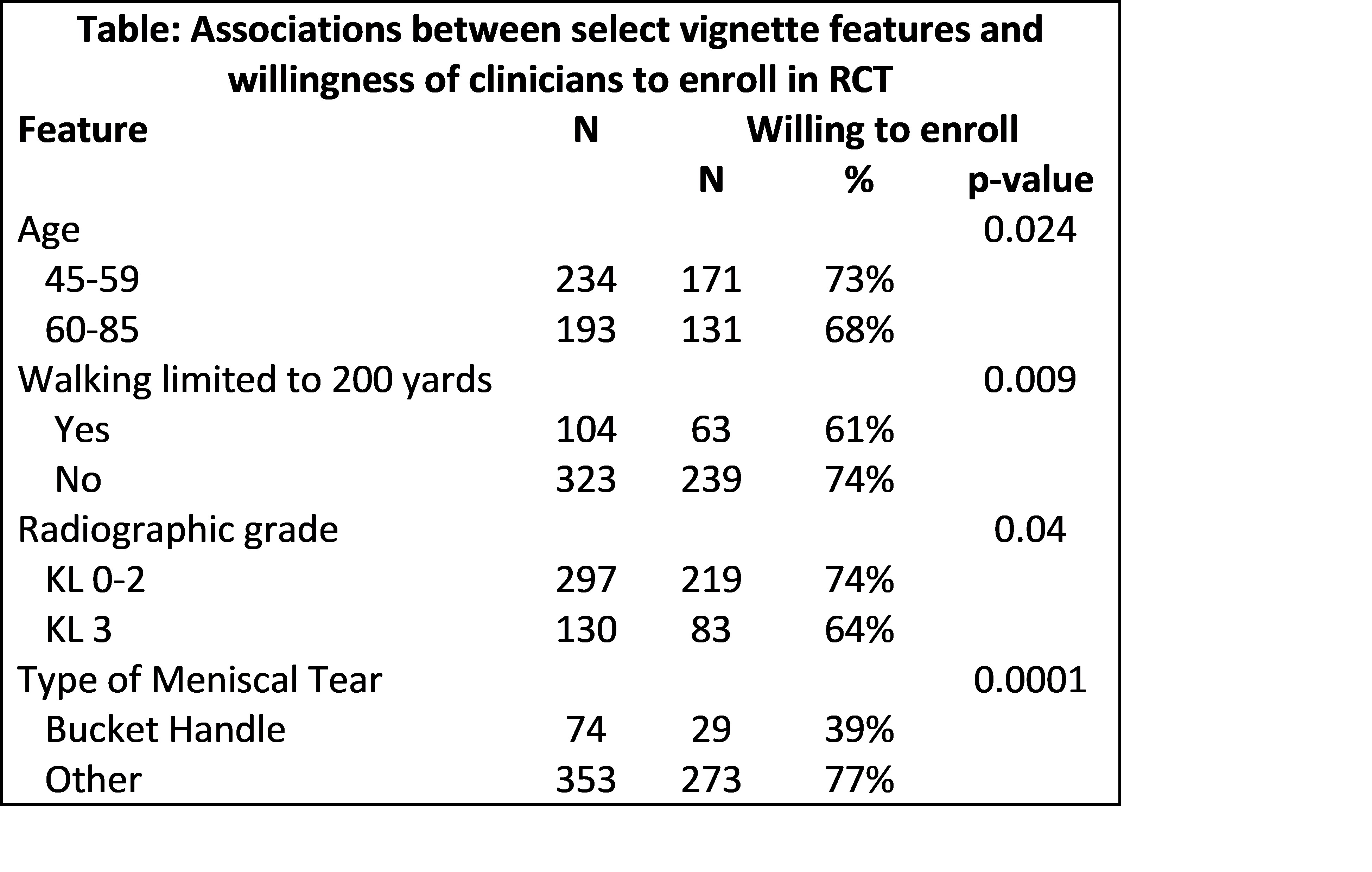Session Information
Session Type: Abstract Session
Session Time: 1:00PM-2:30PM
Background/Purpose: Clinician investigators may be unwilling to enroll all eligible subjects into randomized controlled trials (RCTs) because they feel certain subjects would benefit more from one treatment than the other. Lack of equipoise can slow trial enrollment and bias the sample. We are planning an RCT of arthroscopic partial meniscectomy (APM) vs. enhanced nonoperative therapy (Nonop+) for persons with meniscal tear (MT) and knee osteoarthritis (OA) who remain symptomatic after a course of physical therapy. We conducted a mixed methods study to assess equipoise among enrolling clinicians.
Methods: We developed 29 vignettes of hypothetical patients, all of whom met the eligibility criteria for the trial. We randomly varied 11 vignette features including age, sex, body mass index, symptom type and duration, walking distance, radiographic OA severity, and type of tear. 15 clinicians (orthopedists and physician assistants) participated and used an online polling system to express their willingness to enroll each case as: “Yes, randomize,” “No, advise surgery,” or “No, advise Nonop+.” We conducted a moderated discussion over Zoom following polling, which was recorded and transcribed. The quantitative analysis assessed the number of cases each clinician was willing to enroll and identified clinical features associated with the likelihood of enrollment. To identify factors independently associated with clinicians’ decision to enroll, we performed multivariate logistic regression, accounting for clustering by clinician. We also performed a thematic analysis of the discussion among clinicians.
Results: The 15 clinicians rated 427 vignettes and were willing to enroll 71% (range 24-100%). Among cases clinicians were unwilling to enroll, they favored surgery in 17% and the Nonop+ treatment in 12%. Three clinicians were willing to enroll < 50% of cases. Clinicians were willing to enroll 39% of vignettes with bucket handle tears, as compared with 77% with other tear types (Table). Clinicians were less willing to enroll cases who could not walk >200 yards, who had KL 3 radiographs, and who did not have joint line tenderness (Table). In multivariable logistic regression analyses, bucket handle tear (adjusted OR (aOR) 0.12, 95% CI 0.04, 0.37) and KL3 radiographs (aOR 0.54, 95% CI 0.36, 0.82) were independently associated with unwillingness to randomize at p< 0.01. The qualitative analysis affirmed that clinicians were less inclined to randomize subjects with severe osteoarthritis or marked functional limitation because they favored conservative care, while they were less inclined to randomize subjects with bucket handle tears because they favored surgery.
Conclusion: This vignette-based methodology can be used to project the proportion of eligible subjects that clinicians are likely to enroll in an RCT. The method can also identify clinicians who should be engaged in discussions about equipoise or excluded from the study (e.g. our 3 clinicians willing to randomize < 50% of cases). Finally, it can identify potential modifications in exclusion criteria (e.g., exclude bucket handle tears) that would increase the proportion of eligible subjects randomized.
To cite this abstract in AMA style:
Katz J, Selzer F, Fox K, Dhani J, Long K, Carland A, Thavison T, Bisson L, Jones M, Krupa K, Weiss-laxer N. Will Investigators Enroll? A Vignette Study to Gauge Investigator Equipoise in a Trial of Surgery vs. Nonoperative Therapy in Subjects with Meniscal Tear and Persistent Pain Following Physical Therapy [abstract]. Arthritis Rheumatol. 2024; 76 (suppl 9). https://acrabstracts.org/abstract/will-investigators-enroll-a-vignette-study-to-gauge-investigator-equipoise-in-a-trial-of-surgery-vs-nonoperative-therapy-in-subjects-with-meniscal-tear-and-persistent-pain-following-physical-therapy/. Accessed .« Back to ACR Convergence 2024
ACR Meeting Abstracts - https://acrabstracts.org/abstract/will-investigators-enroll-a-vignette-study-to-gauge-investigator-equipoise-in-a-trial-of-surgery-vs-nonoperative-therapy-in-subjects-with-meniscal-tear-and-persistent-pain-following-physical-therapy/

